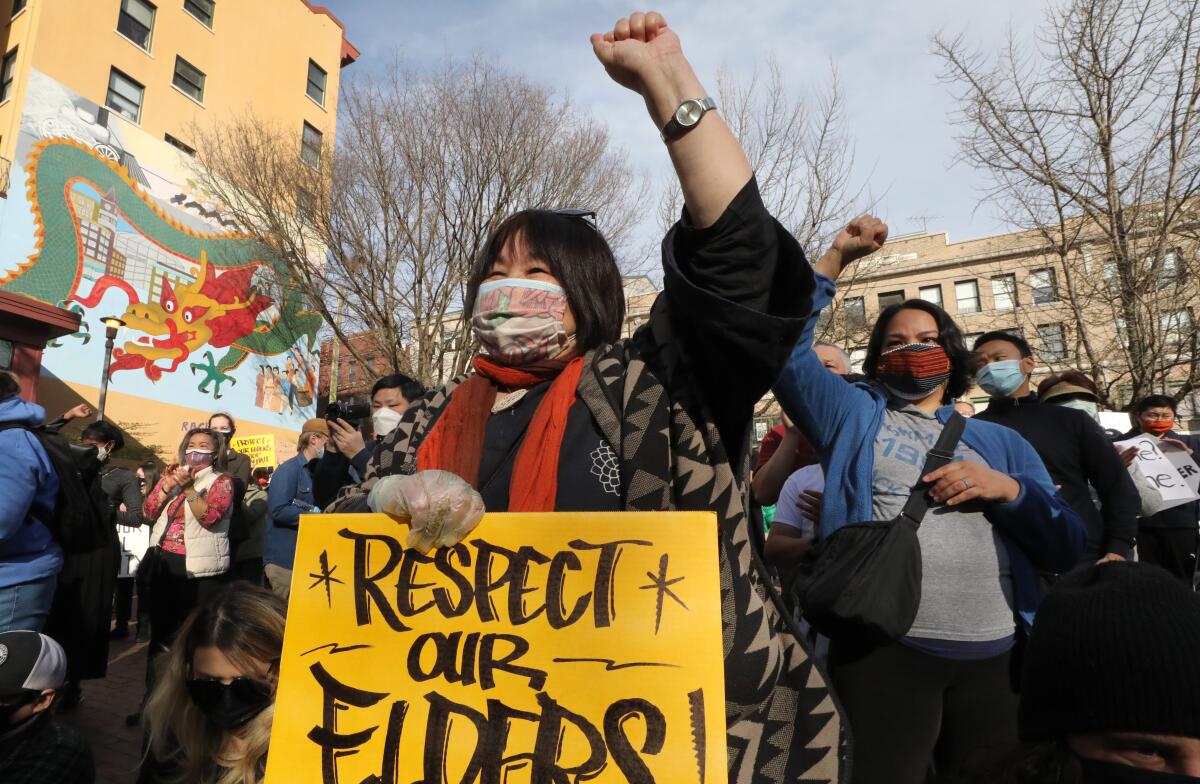Op-Ed: The cruel plot twist in the Asian American story

- Share via
I tell stories for a living, but I’m struggling with this. I don’t know how to make this into a story.
Like others watching the recent rise in anti-Asian harassment and violence, I have been thinking of my parents, my in-laws and their friends. People who have lived here for 50, 60, 70 years. Or, in some cases, their whole lives. There’s a term for these people: Americans.
My dad was an aerospace engineer in Southern California for over 30 years, helping to make airplanes safer. My mom worked two jobs, including one as a public school employee. Both of my wife’s grandfathers served in the United States armed forces during World War II.
I think about the stories they’ve shared with me, what they’ve seen and lived through in this country: recessions and booms, wars and social movements and protests and technological revolutions. Presidents from Truman to Biden. I think about the soccer practices they’ve driven to, the money they’ve saved, the taxes paid, the elections they’ve voted in, the stresses and sleepless nights, the indignities small and large endured, the pride and joy felt in what they’ve accomplished, the neighbors and co-workers befriended and helped and leaned on, the communities they belong to, what it took for them to raise families and build lives here.
And then I think about this: 3,795 incidents reported from March 19, 2020, through Feb. 28.
3,795 reminders that, for some people, it will never be enough.
3,795 lives disrupted, devalued or even destroyed. 3,795 times when someone, out of hatred or ignorance or fear, saw an Asian face, an Asian body, and looked no further. Reduced that person to a single dimension: foreigner. Someone to spit on, curse at, shun, dehumanize, attack.
In doing so, they erase all of it: the years, decades of memories, love, work, service. They erase the stories of these Americans. They harm the victims of these attacks, of course, and Asian American communities, but they harm everyone else, too. Because these attacks are telling a different story. They’re perpetuating the idea that Americans can only look a certain way, sound a certain way. These attacks invalidate American stories, individually and in the collective.
I’ve been thinking about my children. What do I say to them about all of this?
What do I tell these kids, born in the U.S. to parents also born in the U.S.? That they are now and always will be seen by some people primarily as Asian — and nothing more.
I will admit I used to believe in a certain immigrant story, a story about assimilation and what it means to become an American. But the years since November 2016 — and the last few months in particular — have sometimes felt like a late plot twist, a development so dramatic that it forces the reader to reconsider everything up to this point, everything I thought I’d understood.
It’s required me to reevaluate whether the story has the shape I’d assumed, whether I’ve been lying to myself or ignoring the clues all along the way. The anxiety, the sense of dread underneath, the feeling of never being fully secure, that at any moment everything could change.
And then on Tuesday, seeing the news. The killing of eight people in the Atlanta area. Another mass shooting in America, with a gun purchased on the day of the killing. Seeing a local law enforcement officer, Capt. Jay Baker, frame the story from the perspective of the killer, ignoring the misogyny and fetishization that underlies this rampage.
These eight people were more than victims. They were human beings, with lives and families. Xiaojie Tan. Daoyou Feng. Delaina Ashley Yaun. Paul Andre Michels. Soon Chung Park. Hyun Jung Grant. Suncha Kim. Yong Ae Yue.
I’m not saying anything you probably don’t already know. I don’t have an answer — only the sickening feeling of realizing I’ve been reading this story wrong all along. And maybe that’s part of the problem. That I have been waiting for the plot to resolve itself. Hoping for my chance to play some small role. Hoping things would improve. And now having to deal with the fact that, on some level, I’ve always known it was a fantasy.
The events in Atlanta make it impossible to deny that Asians in America — especially Asian women — are seen by some not as people with agency and inner lives, but as props, as dehumanized objects, as set decoration.
Dehumanization cuts across race, sex, gender, religion. It has long affected Black and brown and Indigenous Americans, LGBTQ and other marginalized communities. As Asians in America, we should not be satisfied with being part of someone else’s story, some grand narrative handed down to us. I hope we can strive to tell our own stories, and to use whatever platform or ability we have to also amplify the stories of other marginalized people who seek the same thing.
Charles Yu is the author of “Interior Chinatown,” winner of the 2020 National Book Award for fiction.
More to Read
A cure for the common opinion
Get thought-provoking perspectives with our weekly newsletter.
You may occasionally receive promotional content from the Los Angeles Times.










